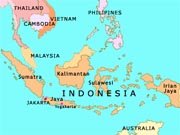Basel hazardous waste conference opens in Bali
 Bali, Indonesia - Representatives from 170 countries kicked off their five-day informal meeting on the Indonesian resort island of Bali on Monday, to discuss how to manage the trans-boundary traffic of hazardous waste.
Bali, Indonesia - Representatives from 170 countries kicked off their five-day informal meeting on the Indonesian resort island of Bali on Monday, to discuss how to manage the trans-boundary traffic of hazardous waste.
Indonesia's Environment Minister Rachmat Witoelar opened the conference, which will focus on the impacts of hazardous waste on human health and livelihoods in terms of the UN's millennium development goals, conference organizers said.
Witoelar said Indonesia's long coastline - the second longest coastal line in the world - made it particular vulnerable to the illegal dumping of toxic waste under the Basel Convention.
The conference will discuss legal aspects of waste import bans, regional cooperation in strengthening the Basel Convention's position, and holding a world forum on waste management related to human health.
The more than 1,000 participants would also discuss the disposal of massive amounts of electronic waste such as old mobile phones.
Agus Purnomo, an Indonesian chief negotiator, expressed the hope the conference reach a compromise among negotiators on the Basel Convention on the control of trans-boundary movements of hazardous wastes and their disposal.
The Basel Convention was adopted in the late 1980s and entered into force in 1992. It requires the export and import of all hazardous waste to be banned to protect human health and the environment against their adverse effects.
However, only 62 member countries have so far ratified the amendment, including Indonesia.
Purnomo was quoted as saying by The Jakarta Post that many developing countries, including Thailand that has set up waste management facilities, disagreed with the Basel ban since they lack hazardous waste to process, while some rich nations are prepared to export their hazardous waste to other countries for cheaper processing.
International activist groups, including Greenpeace and Basel Action Network, have repeatedly called on Basel parties to enforce the ban amendment immediately to prevent further environmental damage.
The conference is expected to issue a "Bali Declaration" aimed at highlighting the importance of health and waste management for global development strategies such as reducing poverty. (dpa)